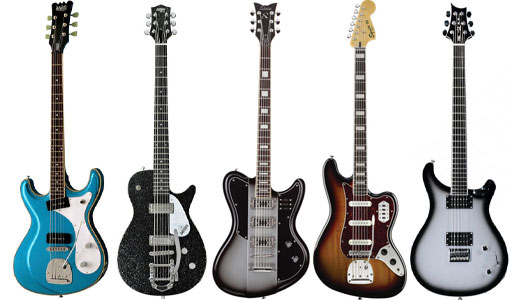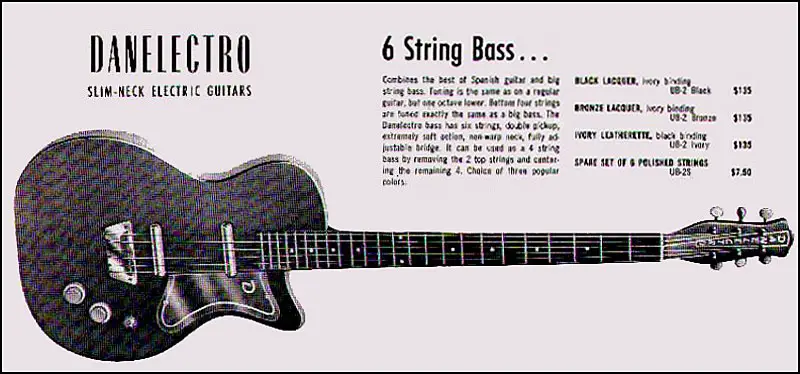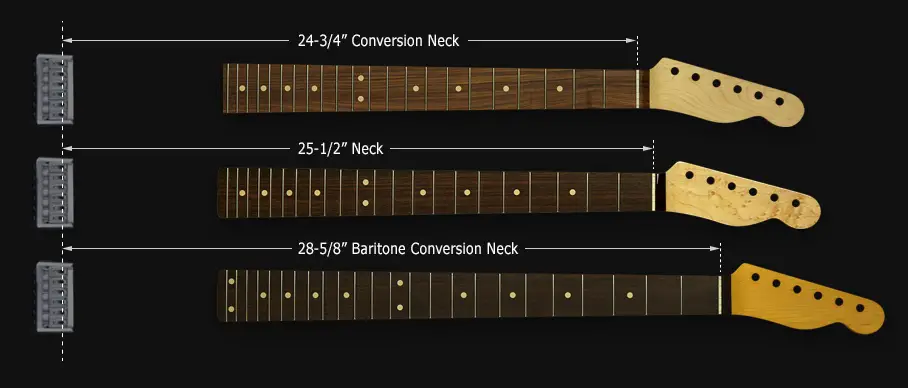Ever felt stuck in a songwriting rut? Ever felt that something was lacking from your six-string sound? Ever wanted a new technical challenge to build your chops? You should consider buying a baritone guitar!
If you want to jump straight to our baritone guitar reviews, please see our list of electric baritone reviews and acoustic baritone reviews. You can also check out our Baritone Guitar Buyer’s Guide — 4 Steps to Buying a Baritone Guitar for more information on your first baritone purchase.
Those who pick up the baritone rarely regret it. It’s a wonderful instrument that will broaden your horizons as a guitarist, a songwriter, and as an overall musician.
Learning the baritone guitar allows you to…
- explore new sounds without learning an entirely new instrument
- breathe new life into your songwriting and make your sonic creations stand out
- become a more versatile guitarist in the studio and live
- build your guitar-playing chops to improve your regular playing
- play detuned metal and hard-rock tones using an electric baritone guitar
- bring new sounds to your jazz, country, folk, pop, surf, swing, and more using an acoustic baritone guitar
In case you’re still not convinced, we’ll discuss some of the main reasons for playing the baritone guitar below. But before we get into the reasons for playing the baritone guitar, let’s introduce this unique instrument properly!

What is a Baritone Guitar?
The baritone guitar has been in mass production since the 1950’s, when Danelectro and other manufacturers began cranking out electric models to meet demand from guitarists playing western music, rockabilly, and early surf sounds. Over the next 50 years, the baritone guitar found its way into every genre of music (if you want to hear examples, check out 5 Famous Baritone Guitar Songs – Songs to Learn on the Baritone)

Today, most baritones still feature the following specs, which distinguish them from standard guitars:
- Lowered factory tuning: A typical baritone is set up for A-standard (aka. perfect 5th) or B-standard (AKA perfect 4th) tuning. In this way, the baritone’s lowest string is usually the same note as (or one step lower than) the highest open string on a four-string bass.
- Increased string gauge: Your average baritone electric will feature string gauges starting out at 13 and topping out at 68. For acoustics, 16 to 70-gauge strings are standard.
- Extended scale length: In guitar speak, scale length is the distance between the nut and the bridge. On a baritone guitar, the scale length may be extended by as much as three inches. A typical Stratocaster will feature a 25.5-inch scale length while most Les Paul’s measure in at 24.75 inches. Most baritones will measure between 26.75 and about 28 inches.

Now we’ve talked a bit about the history and distinctive features of these instruments, let’s dive into the 5 reasons you should own and play a baritone guitar.
1. Buying a Baritone Gives New Sonic Options Without Having to Learn a New Instrument
Yes, a baritone guitar is still a guitar! The baritone has the same fret markings as a standard guitar and is typically tuned to the same intervals as well. So, although it has a distinct sound and feel, you should be able to transfer your existing guitar knowledge over to the baritone guitar easily, and start playing chords, scales, riffs, and solos straightaway!
This combination of an easy learning curve and distinct sound is what makes the baritone so appealing. You can think of it as offering accessible uniqueness – and this uniqueness gets noticed. When I play my baritone for an audience, even non-musicians will compliment my instrument’s unique voice and ask “What’s different about your guitar? It sounds great!”
Having said all this, it’s worth noting that there will be a bit of a learning curve to get really comfortable playing baritone. You’ll need to strengthen your fretting hand to accommodate the larger strings, and make some nuanced adjustments to your strumming and fingerpicking techniques to suit the instrument.
On the other end of that simple learning curve, however, is a wonderful payoff. In the same way that a multi-instrumentalist might ask if a part is better suited for guitar or piano, you will have the delightful option of choosing between your baritone and your standard guitar – a great choice to have that will offer distinct and amazing results.
2. Playing Baritone Will Breathe New Life Into Your Songwriting (and Covers Too!)
Played on a baritone, that original song you dismissed as being too simple suddenly becomes gripping and soulful. The baritone could also be the ultimate sonic weapon for finding the perfect hook for your band’s latest creation. Regardless of its application, there is something enveloping about the baritone sound. Whether played subtly or in the most hard-hitting of musical genres, you’ll find that a baritone’s tone connects at a primal level and inspires new musical creations and approaches.
It’s also worth noting that the baritone guitar can be used to breathe new life into your favorite covers as well! Check out this artful rendition of Comfortably Numb by Thomas Leeb.
3. Playing the Baritone Will Help You Stand Out as a Solo Act or Session Guitarist
Picture this scene: it’s open mic night at a bar in your neighborhood and you’ve brought in some new material for a test run with the local crowd. You step up to the mic and introduce yourself. For a brief moment, you have most of the bar’s fleeting attention. If you are going to have any chance of holding that attention, you need to stand out and you need to do so fast.
Solution: You dive into a soulful number on your baritone guitar in double drop B tuning (which you can learn how to tune to easily if you read our Baritone Guitar Tunings – A Complete Guide to Traditional & Alternative Tunings). The expansive sound of your acoustic baritone and the ringing open notes facilitated by double drop tuning grip the gathered patrons. Your sound is different from that of the last nine guitar-slinging lookalikes. The crowd gets quiet. You hold the room’s attention for your 10-minute set.
With a little bit of songwriting skill, it’s easy to stand out with a baritone. As a singer-songwriter, I have enjoyed writing and performing with the Alvarez ABT60 so much that I have made it one of my primary guitars.
That brings me to my second point in this section. If you’re a session guitarist or anyone who needs to write, record, or perform guitar parts for other artists, then having a baritone in your arsenal will put you ahead of the competition. You’ll have more sonic possibilities at your disposal, which in turn, should make you more employable.
In addition to providing nearly instant distinctiveness, playing baritone can have the following benefits for solo acts and session guitarists:
- Playing baritone may provide a better match for your natural vocal range. If you find yourself using a capo to dial in the perfect key for your voice, you’ll probably feel right at home singing along with a baritone guitar.
- Masters of loop-station work will find that playing baritone provides the opportunity to add tonal depth to loops.
- When you play baritone for the majority of a set, your standard guitar will also stand out when it makes an appearance.
- Being able to switch to a baritone gives you more options for writing, recording and performing different (and often unique) sounding guitar parts.
4. Playing Baritone Guitar Will Strengthen Your Guitar Chops
When it comes to expanding and applying your virtuoso guitar skills, playing baritone can be helpful on several fronts. First, playing on 13 to 70-gauge strings can serve as strength training for your fret hand. Just take your favorite shred drill and attempt it on a baritone.
In the same way that soloing on an acoustic takes more fret hand strength than soloing on an electric, soloing on a baritone demands more strength and dexterity. While it can be taxing, incorporating a baritone into your practice routine will pay dividends in your playing.
Second, the baritone guitar provides an amazing opportunity to apply your skills in new and challenging ways. Indeed, many of the baritone’s most ardent supporters are masters of the standard six-string.
John Petrucci of Dream Theater regularly incorporates his signature model Music Man electric baritone into his work. Pat Metheny has built whole albums around the baritone guitar. Sungha Jung, South Korea’s “prince of guitar,” plays a Lakewood Baritone for many of his original fingerstyle numbers.



None of these guitar heroes started out playing baritone. They each picked up baritone as a means of adding to the palette of sonic colors at their fingertips. As you expand your own skills, why not pick up a baritone guitar? Doing so will challenge the limits of your playing while simultaneously expanding the horizons of your creativity.
5. Playing Baritone Will Allow You to Rock Heavier, Deeper and Harder
So, you want to deliver low-down distorted power chords like an MMA fighter delivering body blows? The quickest and most hassle-free way to transform your rock or metal playing into an extended-range onslaught of tone is by picking up an electric baritone.
Similarly, if have visions of transforming your band’s sound through deep alternative tunings such as dropped B or dropped A tuning, you need a baritone.
While you could pick up a seven-string, doing so comes with a much larger learning curve and some more hassle as you will be forced to adapt to the extra string in your playing. Think about it for a moment, what do you do if you want to play an open G chord shape on your seven string? Do you attempt to mute the first (highest) string or do you incorporate it into the chord and, if so, how? While musical riddles such as these are far from impossible to crack, they can take time to get used to.
For these reasons, many artists opt for a baritone when they want to rock harder and lower, and many manufacturers design electric baritones specifically for metal and rock players, such as the Ibanez RGIB6.
The Next Step on Your Baritone Guitar Journey…
Now that you understand what a baritone is and what playing one can do for you as a musician, take a moment to read our baritone buyer’s guide. It’s the number one ranked baritone guitar buyer’s guide on Google for a reason… it unpacks everything you need to know about buying a baritone guitar and also includes tips on how to set up your baritone and how to play it properly.
And if you want to start looking for your perfect baritone, please check out our electric baritone reviews and acoustic baritone reviews!




